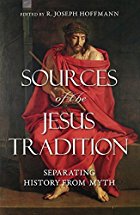After discussing fundamentalist approaches to the Bible — whether fundamentalism on the part of Bible believers or fundamentalism on the part of Bible denigrators — Lester Grabbe concludes:
There is no permanent state of purity nor any established chair of righteousness in scholarship. Even if one suspects that a scholarly position or theory is ideologically motivated — whether from biblical fundamentalism or some other ideology — one should evaluate the position on the basis of stated arguments. Trying to second guess motives has become too much of a pastime in the academy. (p. 23 of Ancient Israel: What Do We Know and How Do We Know It?, my emphasis)
Is there anyone out there who has a history of imputing anti-Christian vendettas to mythicists reading this? Does the shoe fit?
Lester Grabbe continues:
It has become common in recent years to introduce personal motives into arguments: ‘so and so takes this position because he/she is/thinks/believes this or that’. Unfortunately, we can always find reasons to say that someone takes a scholarly position because of personal or ideological motives . . . . Such statements have no place in scholarly argument. In fact, there is probably not a one of us who has not taken a position on some issue for personal reasons, even if totally unconscious of this motive. . . . I am very sensitive to arguments or positions that seem to arise from a fundamentalist stance with regard to the Bible. Yet, as John Emerton once remarked from the floor in a conference, we should reply to the specific arguments rather than what we think might be behind them. . . . (p. 24)
Grabbe discusses an article attacking another that dated the Siloam inscription to the Maccabaean period. The attacking article was headlined “Pseudo-Scholarship”. Grabbe says that this article made some relevant and serious points, but the heading of “Pseudo-Scholarship”
served to prejudice the readership from the start. The redating of the Siloam inscription may be wrong — and most so far think it is — but it is not “pseudo-scholarship”, and such ad hominem comments do not belong in scholarly writing or debate. (pp. 24-5)
If Lester Grabbe has a point, and he probably does, then I have to confess guilt on this count, too. Let’s see what happens from now on.





 Thanks to
Thanks to 
